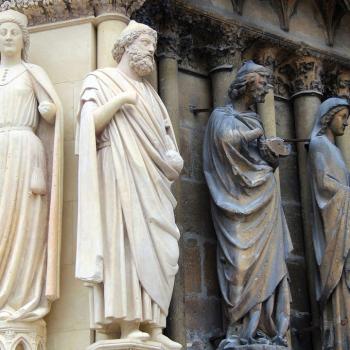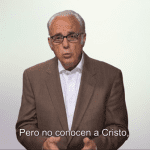Regardless of what atonement metaphor one prefers (I prefer Christus Victor), Christians have historically held the position that in some way, Jesus died to save us.
Some say he died to pay the penalty for our sins, some say he died to defeat the works of the devil, others say he died to unmask our need for a scapegoat, and some will describe it yet other ways.
What is held in common is a belief in salvation through the cross, however one defines the surrounding terms we use in that general discussion.
But this brings us to the question: Who did Jesus die for? And that question brings us to a core Calvinist doctrine: limited atonement.
Limited atonement is a doctrine that begins on the premise of there being two groups of people who have ever lived: the elect and the damned. As Calvinist leader John Piper has previously stated, Calvinism (at least Piper’s flavor) teaches that before you were ever born God decided which category he was going to create your for. You were either created to be saved to eternal life, or created for the purpose of eternal damnation.
This, of course, is insane on an entirely different level, but double predestination isn’t the purpose of this post.
Back to the question: Who did Jesus die for? Everyone? The elect only?
The Calvinist doctrine of limited atonement argues that Jesus died only for the sins of the elect– that the power of the cross was limited to the people God had chosen ahead of time, to be saved.
It reminds me of the Calvinist version of Jesus Loves The Little Children:
“Jesus loves predestined children
All predestined children of the world
Jesus loves you and you, but no, not you
He has love for just a few
Jesus loves predestined children of the world.”
But are Calvinists right? Did Jesus die for the sins of a few?
Of course not– this idea is obnoxiously unbiblical. Here’s what the Bible *actually* says:
“(Jesus) is the atoning sacrifice for our sins, and not only for ours but also for the sins of the whole world.” – 1 John 2:2
To make the idea of limited atonement work, one would need to redefine John’s term of the “whole world” so that such a redefinition didn’t mean “whole world” at all, but somehow came to mean “chosen few.”
We also see this is Paul’s letters to Timothy when he writes:
“This is good, and pleases God our Savior, who wants all people to be saved and to come to a knowledge of the truth. For there is one God and one mediator between God and mankind, the man Christ Jesus, who gave himself as a ransom for all people.” 1 Timothy 2:3-6
Once again, for Calvinist doctrine to work, one would have to argue that “all people” really means “just the elect.”
Those who argue for limited atonement cannot get around these texts. I mean, they try to with ancillary arguments not germane to the actual texts in question, but I have never once found any of those side arguments compelling enough to dismiss the idea that “whole world” and “all people” probably mean exactly that.
Now, does this mean everyone who has ever lived automatically is saved? No, I’m not a universalist (though I hope and pray universal salvation turns out to be true.) What it does mean, however, is that Jesus died for everyone and that his invitation to new life, eternal life, is not a limited invitation that can only be accepted by the chosen few, but is an invitation open to all people.
 Dr. Benjamin L. Corey is a public theologian and cultural anthropologist who is a two-time graduate of Gordon-Conwell Theological Seminary with graduate degrees in the fields of Theology and International Culture, and holds a doctorate in Intercultural Studies from Fuller Theological Seminary. He is also the author of the new book, Unafraid: Moving Beyond Fear-Based Faith, which is available wherever good books are sold. www.Unafraid-book.com.
Dr. Benjamin L. Corey is a public theologian and cultural anthropologist who is a two-time graduate of Gordon-Conwell Theological Seminary with graduate degrees in the fields of Theology and International Culture, and holds a doctorate in Intercultural Studies from Fuller Theological Seminary. He is also the author of the new book, Unafraid: Moving Beyond Fear-Based Faith, which is available wherever good books are sold. www.Unafraid-book.com.
Be sure to check out his new blog, right here, and follow on Facebook:

















